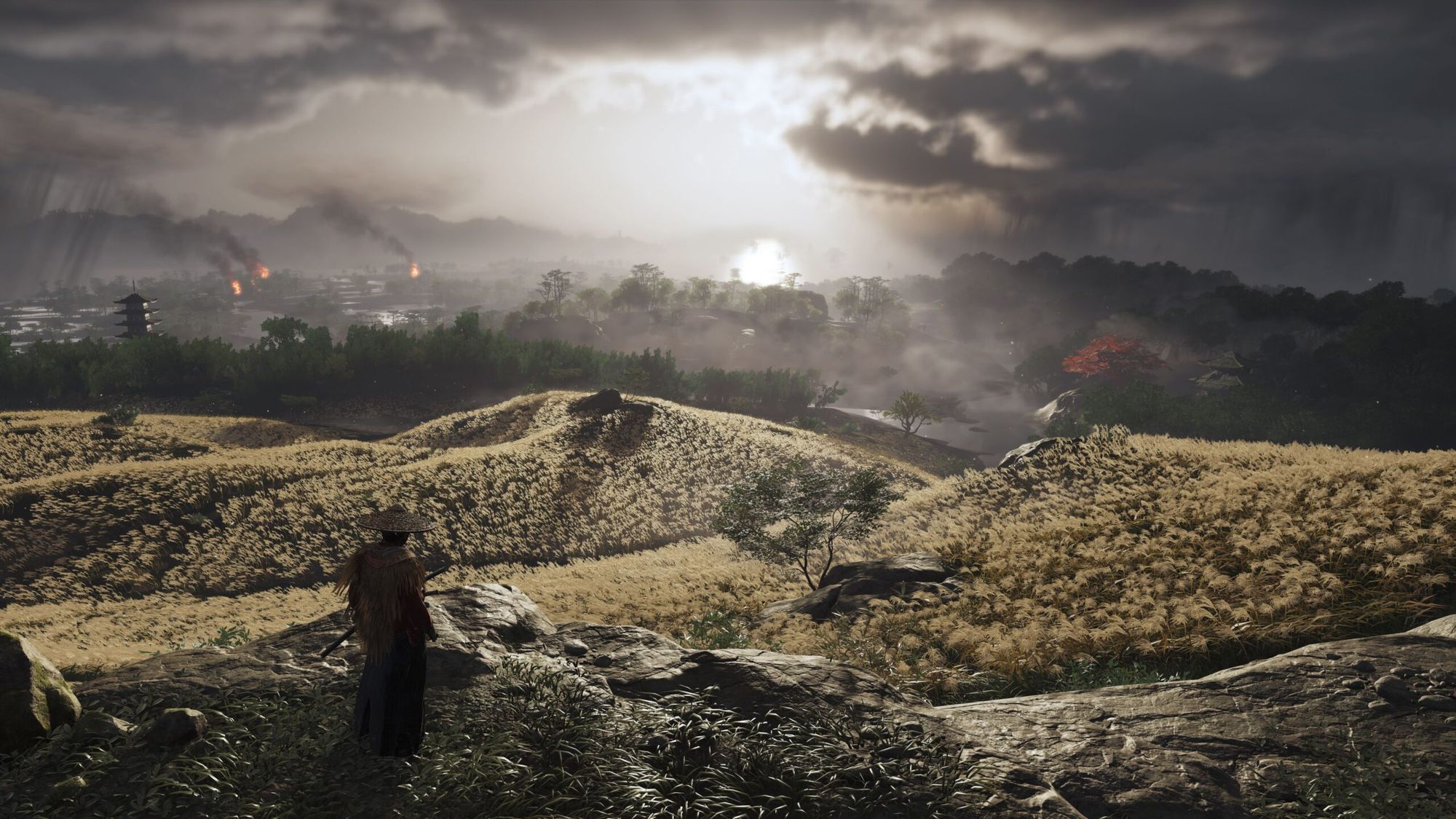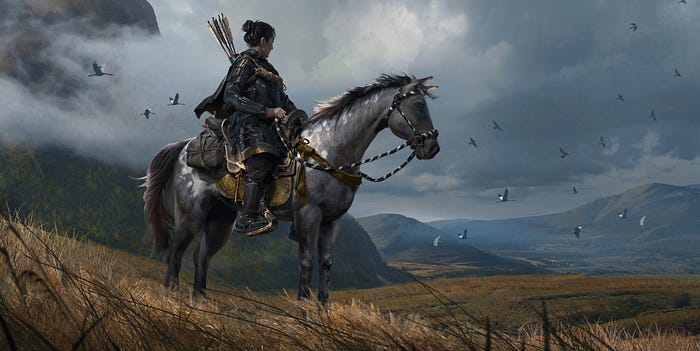Jin Sakai, Ramza Beoulve, and Invisible Revolutionaries
“Do you truly believe you can change the world? Not even I am so naïve as that.”


What does it mean to be a class hero? One that fades from memory, not to be a martyr or a legend but instead act as a catalyst for greater change?
In video games, we often play as grand, swashbuckling heroes — characters who are larger than life because of their supernatural abilities, endless ammunition, gigantic swords, or the cadre of gods at their disposal. While the games that these characters inhabit don’t always have stories that follow the logic of the gameplay (no Phoenix Down Aerith, sorry) the plot that surrounds them is still greater than anything any one of us will experience in our normal lives. Despite my greatest and most fevered wants, I will never ride an airship or fight toe to toe with a dragon god.
It’s a rarer thing when video game plots follow the designs of (relatively) normal people looking to make a change. While this definition of “normal” can be easily poked and prodded (I will also never have the sword skill of Jin Sakai or the magick of Ramza Beoulve), these class revolutionaries did not set out on some grand scheme of saving the world from a plunging meteor or a nuclear fallout. Instead, these are heroes who inspired the people around them, who took up a cause when no one else would, despite the overwhelming struggle.
We live in a world of constant social and political turmoil, one that we regularly escape from by playing video games. While it’s fun to exist as these larger than life characters, it’s a refreshing change of pace when a video game plot has more to say beyond ‘“save the world and kill a god.” Final Fantasy Tactics impressed upon my youthful mind the same incredible ideologies and class conscious struggles that Ghost of Tsushima did recently, and both of these games follow selfless protagonists who risk everything in order to make a better life for their friends and countrymen. Their similarities run deep, and they mirror a political standing in their games that is incredibly important to all of our lives: stand tall against fascism, protect those you love, and fight for your home.

From Privilege to Service
Jin Sakai and Ramza Beoulve are both men who come from means but are struck down by the circumstances surrounding them. Jin grew up in Omi Village, was heir to the Sakai samurai clan, and fought with honor for the shogunate and Imperial Empire of Japan. Ramza grew up as the youngest son of the honorable House Beoulve, attending the prestigious academy of Gariland in order to become a squire and knight that would one day represent the needs of his House and country. Jin and Ramza both came from means, and it wasn’t until they lost everything that their eyes were opened to the corruption around them.
While Jin Sakai initially takes to war by preventing the siege of the Mongols upon Tsushima Island, his heroic rise as the Ghost makes the shogunate and the Imperial Empire of Japan nervous, which forces the hand of his liberal Uncle Lord Shimura. The Ghost is a legend, a war cry of the peasant class, a hero of the people who will stand against any injustice. Similarly, Ramza Beoulve seeks to rout his country of the Corpse Brigade, a band of brigands who are pillaging and ransoming the lands of his brother, Dycedarg. It is during Ramza’s earnest attempt at proving he is more than just a bastard that he comes toe to toe with the truth behind the kidnappings and pillaging, and how the current ills of the peasant class have been caused by the corrupt greed of the nobility after abandoning the homeless veterans of the Fifty Years’ War.
Jin Sakai and Ramza Beoulve both comprise a particular brand of hero that prizes moral authority over all else, heroes who view their truths as straight and narrow, who fight not for coin or means or land but because sticking up for the meager is within the moral right. They both become peasant heroes, shadowy figures that the lowborn class can openly celebrate. Jin and Ramza are both headaches for the nobility in their respective games, each protagonist fed up with the corruption of the ruling class and how, despite their endless struggles, protecting their homelands is meaningless if the rot is deep within.
RAMZA: I see no good in using people! Only deception, and death! I will not
stand by any longer as innocents fall prey to your good!

From Folk Hero to Legend
As his incredible deeds give rise to the legends of the Ghost, Jin Sakai is viewed as a potential problem for the shogunate, because they are afraid of what he represents for those of the working class of Japan: the working poor, the farmers, the blacksmiths, those whose family names will never become honorable estates. The Ghost is more than a man, he is a titanic hero whose deeds represent the will of the oppressed. Jin Sakai does far more than simply drive the Mongols away from Tsushima Island — he inspires an entire generation to rise up against oppression. Near the end of the game, Jin Sakai’s uncle Lord Shimura comes to him with an unfortunate demand — he must lay down the mantle of the Ghost forever, or be excommunicated from the samurai class.
Jin Sakai must forsake the samurai code, because it belongs to the unfortunate few who value such ideologies above the plights of real people. Governments and laws should exist only for those they have sworn to protect. Platitudes have no meaning if they cannot save the most vulnerable. In their final exchange, when Lord Shimura and Jin must back their beliefs with their blades, Jin tells his uncle just exactly how he feels about the brittle samurai code:
LORD SHIMURA: You have no honor.
JIN SAKAI: And you are a slave to it.
Similarly, Ramza realizes that his brothers’ corruption is more than just a lie about the Corpse Brigade and their place in the coming War of the Lions. House Beoulve is corrupt, utilizing the war for its own ends in order to manipulate a place of prestige in greater Ivalice. Not only did Dycedarg plan the kidnapping of the Marquis and seek to undermine the lowborn rebellion, but it is discovered late in the game that he actually poisoned his own father in order to take over House Beoulve in his stead. Ramza denounces his Beoulve name, takes up his mother’s maiden title, and becomes a heretic of the church. He is through and through a man of the people, not fighting for the crown, the dukes, or his own House. Ramza only cares about uncovering the truth, protecting those he loves, and standing for moral righteousness.
As we’ve seen from our own real world history, the evolution from ignorance to understanding is a path taken by many revolutionaries. It is during one important, life-changing moment early in the game that Ramza is faced with his own harsh reality:
DELITA: There are things beyond the power of our changing, Ramza, try though we might.
RAMZA: Do not say that. If a thing can be endeavored, it —
DELITA: Will endeavor grant me an army? I would save Tietra with these hands, if aught were in my power to do. But I cannot. ’Tis my meager lot in this life…
Both of these iconoclasts tell an important story that stretches far beyond any singular historical event or video game. Class consciousness — and the struggle of rich versus poor, the haves and the have nots — is a problem at the very core of every society that’s rooted in capitalism or caste. Human beings want to believe that they are more than their birth, more than their money, more than the circumstances that they are surrounded by.

The Ghost and the Heretic
One of the most important aspects of both Jin and Ramza are that their greatest accomplishments are not managed alone, but supported by their comrades. Neither of them are immune to betrayal (whether it be Lord Shimura or Delita Heiral), but even the most challenging moments did not stop either character from seeking out the wisdom of those around them. The true Ghost is an amalgamation of the many people across Tsushima Island that sought to grow his legend. Jin Sakai believed in the power of his comrades, and invested his time, blood, and energy into the struggles of others because he knew the exchange would make him stronger. The comrades that Sakai found across the island gathered him a retinue of proficient allies.
JIN SAKAI: I sacrificed everything for my people, and I would do it again.
Ramza’s quest across Ivalice and the regions of his homeland gained him a group of similar ne’er-do-wells that comprised a party of skill, means, and efficiency. The struggle of his efforts was not one built alone, but made because of the good will he presented to those who shared his moral passions. Similarly to Jin Sakai, Ramza’s efforts culminate in a literal army of comrades who supported his point of view and fought to the death because they believed in his cause.
For Jin Sakai, there will never be another Komoda Beach. For Ramza Beoulve, there will never be another Tietra. These moments of sacrifice, these losses have built upon them the importance of fighting with belief, with meaning. Jin must face the awful truth that it was not just the Mongols who killed the samurai that day, but the toxic idea of the code of honor that betrayed him and everyone around him, a code that cares not for people, but for empire. Ramza, when the crossbow bolt flies and takes Delita’s innocent sister from the world, is shown without doubt that the nobility sees them not as people, but as chattel.
RAMZA: As it was my fate to let Tietra die? No, fate had no hand in that.
Tietra died because I could not be bothered to save her. I’ve lied to myself
all this time. It was my own inaction that killed her!
Despite fighting hard for the causes they believe in, both Ramza and Jin are branded as traitors, as heretics. They are stripped of everything they once loved and pushed into the obscurity of history. This is the effectiveness of narrative control, of “History is written by the victors” (a quote that, ironically enough, is attributed to Winston Churchill but actually of unknown origin). Both the bastard Ramza and Clan Sakai are ripped from history, erased by those with means who wish to snuff out the fires of rebellion and revolution. Ghost of Tsushima ends with an unfortunate stand-off between Jin and his uncle, where he might abandon his name entirely for the Ghost; Final Fantasy Tactics ends with Ramza riding off into an unknown future, his name erased from the history books. Despite the attempts of the ruling class, the echoes of their causes are long felt, their stamp on the world not one of celebration or iconography but of struggle. The Ghost and Ramza fought to make the world a better place, and at that they succeeded.

Believing in the Moral Good
It’s not only important to stand up for the poor, huddled masses — it’s imperative. When Jin Sakai and Ramza Beoulve are confronted by the realities and cruelties of privilege, they cast it away in favor of fighting for what is right. To say that video games are not (or should not be) political decries the very nature of the art form, a medium that has the ability to present revolutionary characters and ideas in a new creative way.
It’s rare that we see heroes of this caliber in the gaming lexicon. Rebels of class and circumstance who risk everything — down to their very names and identities — because they believe so strongly in doing what is right and stamping out the evils of the powerful. Our own world is filled with revolutionaries, people who fought against their government, their state, and the unjust laws of their time. While it’s easy enough for us to be distracted by the otherworld of gaming, Ramza Beoulve and Jin Sakai are reminders of what is actually at stake and what matters. I applaud the scenario writers and game developers who take chances on characters that inspire others, whose revolutionary actions create waves throughout time and history and add to the momentum of what we are currently seeing in our own lifetimes.
Jin Sakai and Ramza Beoulve may be invisible in their respective games, but to us, they are titanic reminders of what can be accomplished by resisting privilege and oppression, by fighting for what is right, and by standing up for those who cannot fight for themselves.
RAMZA: House Beoulve is no more. But what does it matter? We are the sum of our deeds, not our names.
